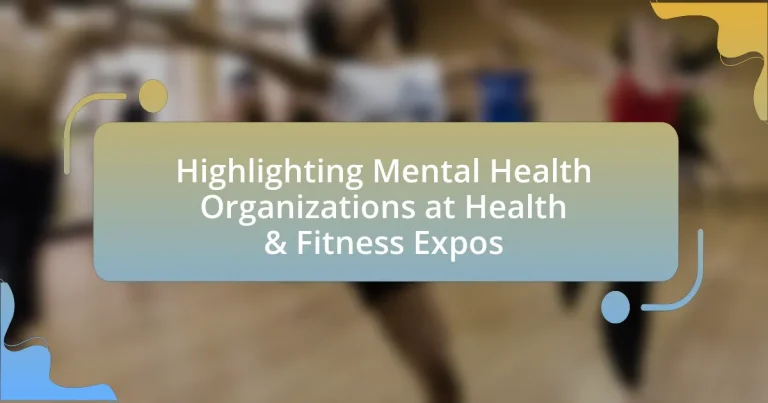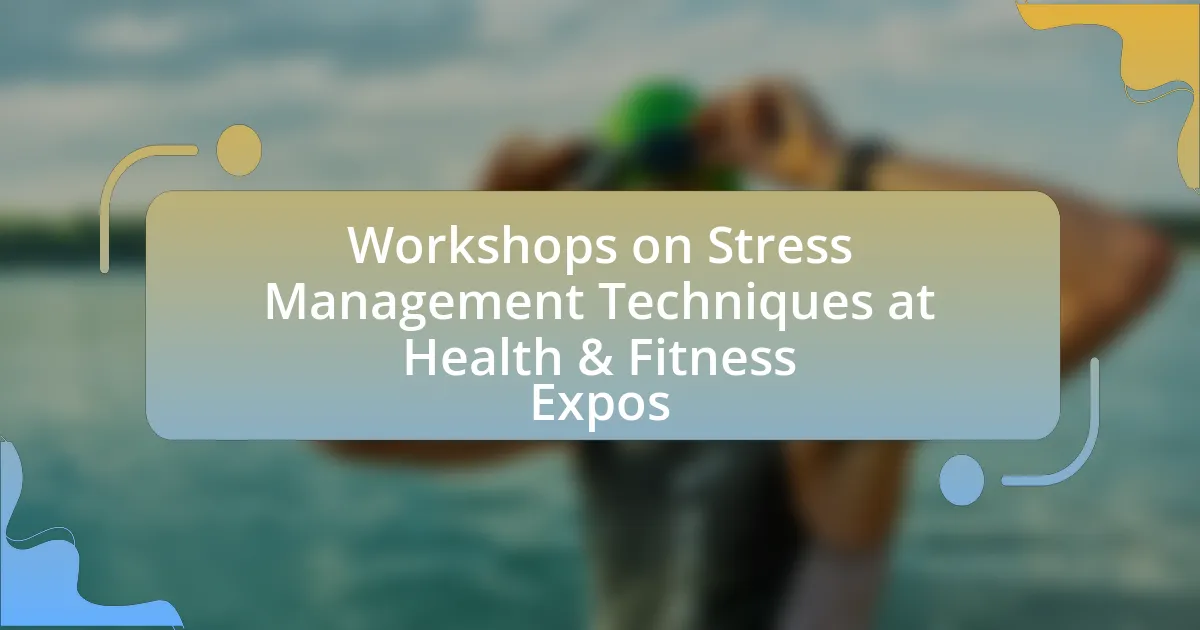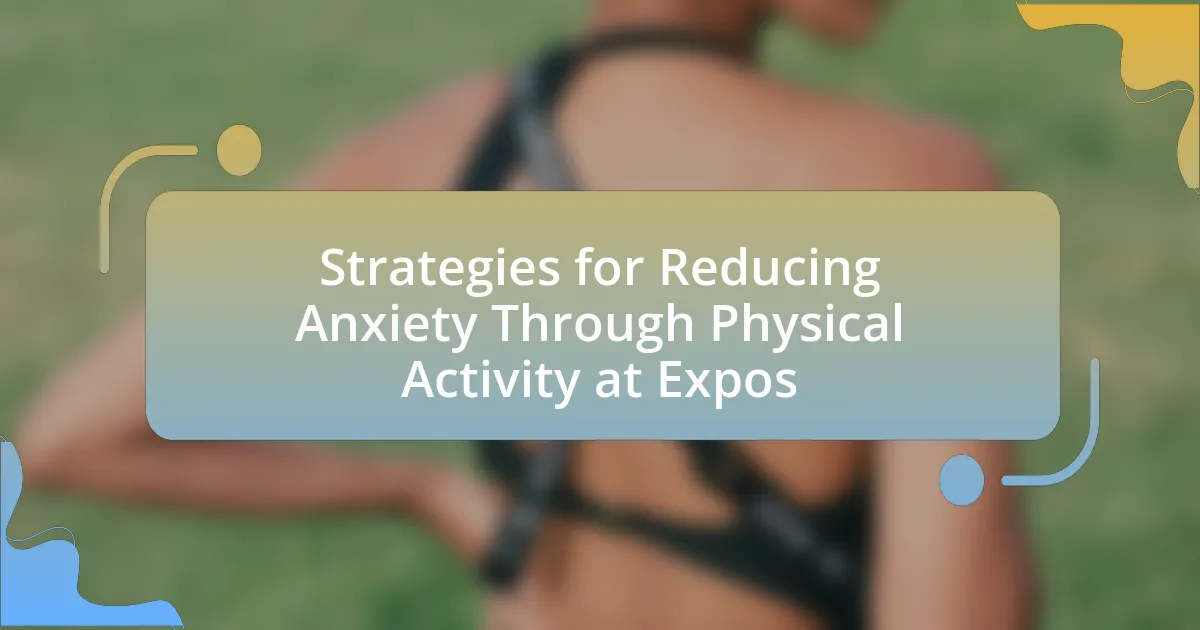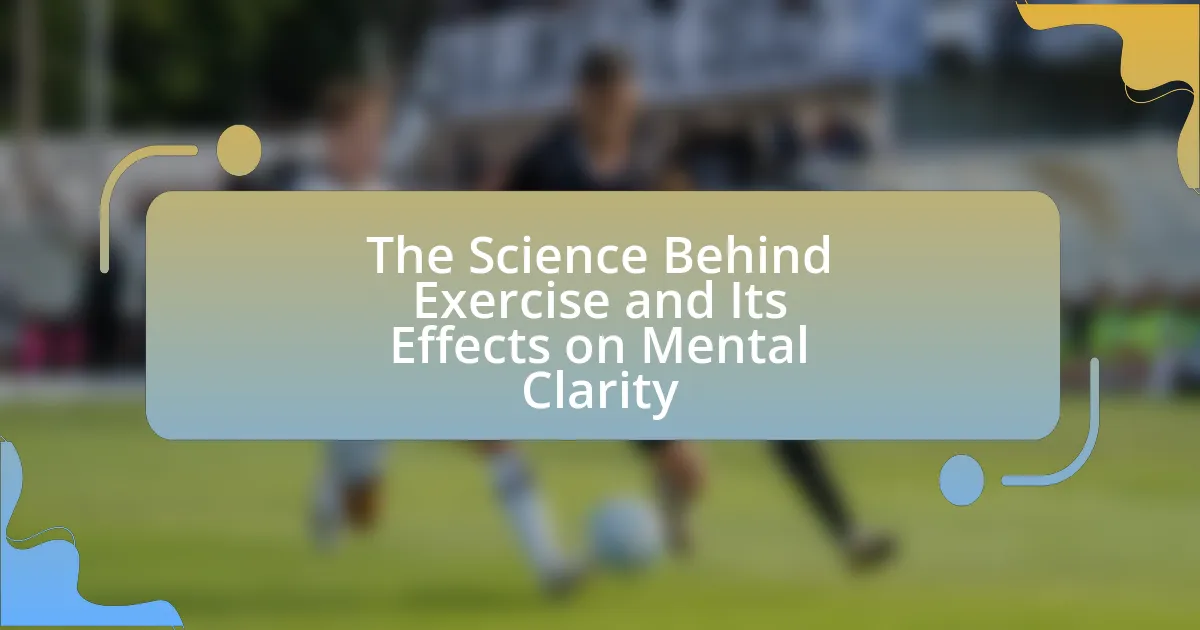Mental health organizations are dedicated entities that promote mental well-being and advocate for mental health awareness, particularly at health and fitness expos. These organizations provide educational resources, workshops, and support services that emphasize the critical link between mental health and overall wellness. Their participation helps destigmatize mental health discussions, encourages attendees to prioritize mental wellness alongside physical fitness, and fosters a holistic approach to health. The article explores the various roles these organizations play at expos, the specific services they offer, and the impact of mental health awareness on fitness and health, ultimately highlighting the importance of integrating mental health into the broader health and fitness dialogue.

What are Mental Health Organizations and Their Role at Health & Fitness Expos?
Mental health organizations are entities dedicated to promoting mental well-being, providing resources, and advocating for mental health awareness. At health and fitness expos, these organizations play a crucial role by offering educational materials, workshops, and support services that emphasize the importance of mental health in overall wellness. For instance, the National Alliance on Mental Illness (NAMI) often participates in such events to raise awareness about mental health issues and provide resources for individuals seeking help. Their presence at these expos helps to destigmatize mental health discussions and encourages attendees to prioritize mental wellness alongside physical fitness.
How do Mental Health Organizations contribute to Health & Fitness Expos?
Mental health organizations contribute to health and fitness expos by providing resources, education, and support focused on mental well-being. These organizations often host workshops and seminars that address the importance of mental health in overall fitness, emphasizing the connection between physical activity and mental wellness. For instance, studies show that regular exercise can reduce symptoms of anxiety and depression, which mental health organizations highlight during these events. Additionally, they may offer informational materials and access to mental health professionals, fostering a holistic approach to health that integrates both physical and mental aspects.
What specific services do these organizations provide at expos?
Mental health organizations at expos provide services such as informational booths, mental health screenings, workshops, and resources for support. These services aim to educate attendees about mental health issues, promote awareness, and offer immediate assistance through screenings that can identify mental health conditions. Workshops often focus on coping strategies, stress management, and wellness practices, enhancing attendees’ understanding of mental health. Additionally, organizations distribute literature and resources that guide individuals toward further support and treatment options, thereby fostering a supportive community environment at the expos.
How do they engage with attendees during the events?
Mental health organizations engage with attendees during events by offering interactive workshops, informational booths, and personalized consultations. These activities allow attendees to actively participate in discussions about mental health, learn coping strategies, and access resources tailored to their needs. For instance, organizations may conduct live demonstrations of mindfulness techniques or provide materials that educate attendees on mental health issues, thereby fostering a supportive environment. This approach not only raises awareness but also encourages open dialogue about mental health, making the events more impactful for participants.
Why is it important to highlight Mental Health Organizations at these events?
Highlighting Mental Health Organizations at health and fitness expos is crucial because it raises awareness about mental health issues and promotes resources available for support. These events attract diverse audiences, providing a platform to educate attendees on the importance of mental well-being alongside physical health. Research indicates that mental health significantly impacts overall health; for instance, the World Health Organization states that mental disorders affect one in four people globally. By featuring mental health organizations, expos can facilitate conversations, reduce stigma, and encourage individuals to seek help, ultimately fostering a more holistic approach to health.
What impact does mental health awareness have on fitness and health?
Mental health awareness significantly enhances fitness and health by promoting holistic well-being and encouraging individuals to address both physical and mental health needs. Increased awareness leads to greater acceptance of mental health issues, which can reduce stigma and encourage individuals to seek help, ultimately improving their overall fitness outcomes. Research indicates that individuals who engage in regular physical activity experience lower levels of anxiety and depression, as noted in a study published in the Journal of Clinical Psychiatry, which found that exercise can be as effective as medication for some individuals with depression. Furthermore, mental health awareness initiatives at health and fitness expos can provide resources and support, fostering a community that prioritizes both mental and physical health, thereby leading to improved health behaviors and outcomes.
How can the presence of these organizations influence public perception of mental health?
The presence of mental health organizations at health and fitness expos can significantly influence public perception of mental health by increasing awareness and reducing stigma. These organizations often provide educational resources, workshops, and expert speakers, which help to inform attendees about mental health issues and the importance of seeking help. For instance, a study published in the Journal of Mental Health found that community engagement initiatives, such as those at expos, can lead to a 30% increase in public understanding of mental health conditions. By normalizing conversations around mental health and showcasing available support services, these organizations foster a more accepting and informed community perspective.

What Types of Mental Health Organizations Participate in Health & Fitness Expos?
Various types of mental health organizations participate in health and fitness expos, including non-profit mental health advocacy groups, community mental health centers, and private mental health practices. These organizations aim to promote mental wellness, provide resources, and raise awareness about mental health issues. For instance, the National Alliance on Mental Illness (NAMI) often engages in such events to educate the public and reduce stigma surrounding mental health. Additionally, local mental health services may set up booths to offer information on available support and treatment options, demonstrating their commitment to community health.
What are the different categories of Mental Health Organizations represented?
The different categories of mental health organizations represented include non-profit organizations, government agencies, private practices, educational institutions, and advocacy groups. Non-profit organizations often focus on providing support and resources for individuals with mental health issues, while government agencies may offer public health initiatives and funding for mental health services. Private practices provide clinical services, and educational institutions may conduct research and training in mental health. Advocacy groups work to raise awareness and influence policy related to mental health issues. Each category plays a vital role in addressing mental health needs within communities.
How do non-profit organizations differ from for-profit mental health services at expos?
Non-profit organizations differ from for-profit mental health services at expos primarily in their mission and funding structure. Non-profits focus on providing accessible mental health resources and support to the community, often relying on donations, grants, and volunteer efforts, while for-profit services prioritize generating revenue and profit, which can influence the pricing and availability of their services. For instance, non-profits may offer free workshops or counseling sessions at expos to promote mental health awareness, whereas for-profit entities might charge fees for similar services, reflecting their business model. This distinction impacts the overall approach to mental health advocacy and service delivery at such events.
What role do educational institutions play in these events?
Educational institutions play a crucial role in health and fitness expos by providing research, resources, and expertise on mental health. They often collaborate with mental health organizations to disseminate knowledge, promote awareness, and offer workshops or seminars that educate attendees about mental health issues. For instance, universities may present studies on the impact of physical fitness on mental well-being, thereby reinforcing the connection between physical health and mental health. This collaboration enhances the credibility of the information shared at these events and fosters a supportive environment for discussions on mental health.
How do these organizations tailor their messages for fitness audiences?
Organizations tailor their messages for fitness audiences by emphasizing the connection between physical health and mental well-being. They utilize targeted communication strategies that resonate with fitness enthusiasts, such as promoting the benefits of exercise on mental health, sharing success stories, and providing evidence-based information. For instance, studies show that regular physical activity can reduce symptoms of anxiety and depression, which these organizations highlight to engage their audience effectively. By aligning their messaging with the values and interests of fitness audiences, they foster a supportive environment that encourages holistic health approaches.
What strategies do they use to connect with fitness enthusiasts?
Mental health organizations connect with fitness enthusiasts through targeted outreach, educational workshops, and collaborative events. These organizations often set up booths at health and fitness expos to engage directly with attendees, providing resources and information on the mental health benefits of physical activity. They may also host seminars featuring expert speakers who discuss the relationship between fitness and mental well-being, thereby attracting fitness enthusiasts interested in holistic health. Additionally, partnerships with fitness influencers and trainers help amplify their message, reaching a broader audience. For instance, studies show that physical activity can reduce symptoms of anxiety and depression, reinforcing the importance of these connections.
How do they address the unique mental health challenges faced by athletes?
Mental health organizations address the unique mental health challenges faced by athletes by providing specialized support services, resources, and educational programs tailored to the athletic community. These organizations often offer mental health screenings, counseling, and workshops focused on stress management, performance anxiety, and coping strategies specific to the pressures of competitive sports. For instance, the National Athletic Trainers’ Association emphasizes the importance of mental health in athletic training and provides guidelines for mental health interventions. Additionally, research published in the Journal of Sports Sciences indicates that athletes are at a higher risk for mental health issues, reinforcing the need for targeted mental health resources and support systems within sports organizations.
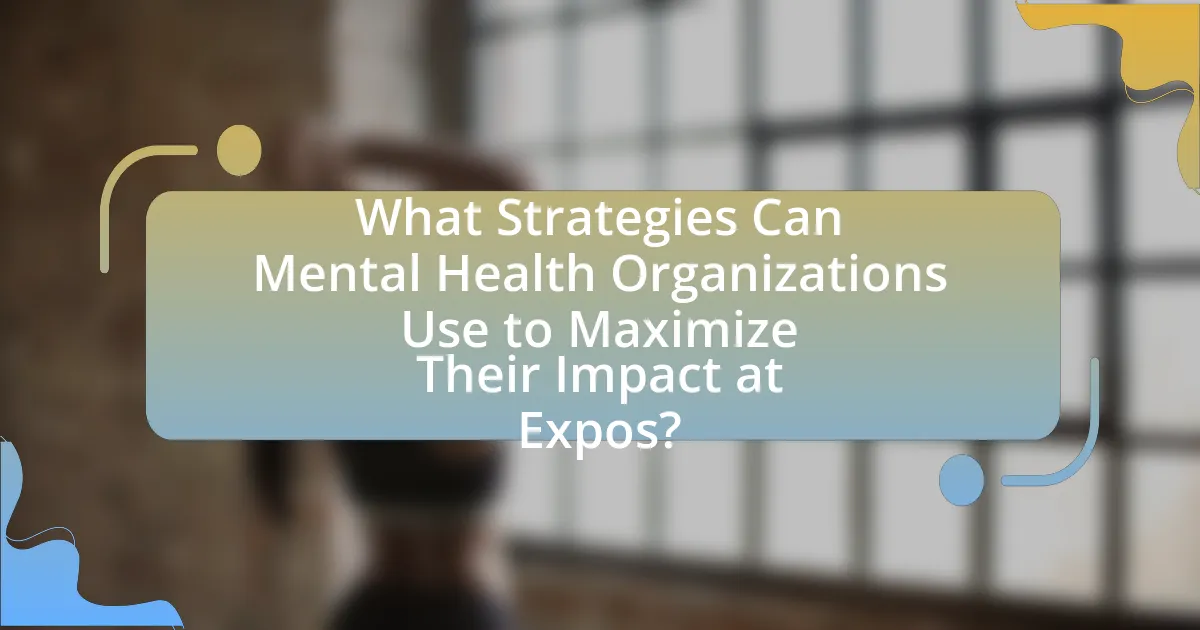
What Strategies Can Mental Health Organizations Use to Maximize Their Impact at Expos?
Mental health organizations can maximize their impact at expos by implementing interactive engagement strategies, such as workshops and live demonstrations. These activities not only attract attendees but also provide valuable, hands-on experiences that enhance understanding of mental health issues. For instance, research indicates that interactive learning can increase retention rates by up to 75%, compared to traditional lecture formats. Additionally, organizations should utilize social media campaigns to promote their presence before and during the event, leveraging platforms like Instagram and Twitter to reach a broader audience. This approach can increase booth traffic and foster community engagement, as evidenced by a study showing that 70% of attendees are influenced by social media interactions when deciding which booths to visit. Finally, collaborating with influencers or mental health advocates can amplify their message and credibility, as partnerships with trusted figures can lead to a 50% increase in audience reach.
How can Mental Health Organizations effectively promote their services at expos?
Mental health organizations can effectively promote their services at expos by engaging attendees through interactive booths, informative materials, and workshops. Interactive booths that include activities such as mental health screenings or mindfulness exercises attract visitors and create a memorable experience. Providing brochures, flyers, and business cards with clear information about services and resources ensures that attendees leave with tangible materials to reference later. Additionally, hosting workshops or panel discussions on relevant mental health topics can position the organization as a knowledgeable authority, drawing in participants who are interested in learning more. Research indicates that experiential marketing, which includes interactive elements, can increase brand recall by up to 70%, demonstrating the effectiveness of these strategies in engaging the audience and promoting services.
What types of materials and resources should they provide to attendees?
Mental health organizations should provide informational brochures, resource guides, and interactive materials to attendees. Informational brochures can outline mental health services, support groups, and crisis intervention resources, ensuring attendees have access to essential information. Resource guides can include local mental health professionals, hotlines, and community services, facilitating connections for those in need. Interactive materials, such as stress-relief tools or mindfulness exercises, can engage attendees and promote mental well-being. These resources are crucial as they empower individuals with knowledge and support options, contributing to overall mental health awareness at health and fitness expos.
How can interactive activities enhance their presence at the event?
Interactive activities can enhance the presence of mental health organizations at health and fitness expos by actively engaging attendees and fostering meaningful connections. These activities, such as workshops, demonstrations, or interactive booths, allow organizations to showcase their services and expertise in a dynamic way, making their message more memorable. For instance, studies indicate that experiential learning increases retention rates by up to 75%, compared to traditional methods. This engagement not only raises awareness about mental health issues but also encourages dialogue, helping to destigmatize mental health topics. By creating an immersive experience, organizations can effectively attract and retain the attention of attendees, ultimately leading to increased visibility and support for their initiatives.
What best practices should organizations follow to engage with attendees?
Organizations should prioritize interactive experiences to effectively engage with attendees. This can include hands-on workshops, live demonstrations, and Q&A sessions that encourage participation. Research indicates that interactive formats significantly enhance attendee retention and satisfaction, with studies showing that participants are 70% more likely to remember information presented in an engaging manner compared to passive formats. Additionally, organizations should utilize social media to create pre-event buzz and encourage real-time engagement during the event, as 78% of attendees report being more likely to engage with brands that actively communicate on social platforms. By implementing these practices, organizations can foster a more dynamic and memorable experience for attendees.
How can they create a welcoming environment for discussions about mental health?
To create a welcoming environment for discussions about mental health, organizations should prioritize open communication and active listening. This can be achieved by training staff and volunteers to engage empathetically with attendees, ensuring that conversations are respectful and non-judgmental. Research indicates that environments fostering psychological safety, where individuals feel comfortable sharing their experiences without fear of stigma, significantly enhance participation in mental health discussions. For instance, a study published in the Journal of Mental Health found that supportive community settings lead to increased openness about mental health issues, thereby promoting awareness and understanding.
What follow-up strategies can be implemented post-expo to maintain engagement?
Post-expo, effective follow-up strategies to maintain engagement include personalized email outreach, social media interaction, and hosting webinars. Personalized email outreach allows organizations to thank attendees for their participation, share valuable resources, and provide updates on mental health initiatives, which fosters a sense of community and ongoing dialogue. Social media interaction encourages continued engagement by sharing content related to mental health, promoting discussions, and inviting feedback, thus keeping the conversation alive. Hosting webinars offers an opportunity for deeper engagement, allowing organizations to present expert insights and answer questions, reinforcing their commitment to mental health awareness. These strategies are supported by research indicating that consistent communication enhances participant retention and strengthens relationships, as seen in studies on community engagement in health initiatives.
What are the key takeaways for Mental Health Organizations participating in Health & Fitness Expos?
Mental Health Organizations participating in Health & Fitness Expos should focus on increasing awareness, fostering community engagement, and promoting mental wellness resources. These organizations can leverage the high foot traffic at expos to educate attendees about mental health issues, thereby reducing stigma and encouraging open conversations. Engaging with diverse audiences allows for the dissemination of valuable information on mental health services and support systems, which is crucial given that approximately 1 in 5 adults experience mental illness in a given year. Additionally, collaboration with fitness professionals can highlight the connection between physical activity and mental health, reinforcing the importance of holistic wellness.
